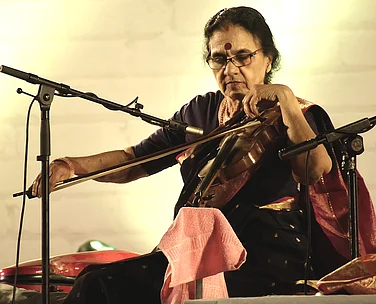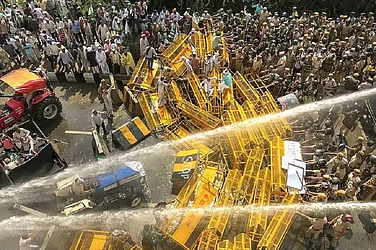Conventional wisdom has it that neither regional outfits nor filmstars have ever dominated Karnataka’s politics. But then, ‘maverick’ has been Upendra’s calling card ever since he arrived on the Kannada film scene in the early 1990s. The 49-year-old actor-director now wants to script a change.
Like Kamalahaasan in neighbouring Tamil Nadu, Upendra says he is in politics for the long haul as he doesn’t want to “just keep complaining”. “If you seek change, you should get into the thick of it,” he tells Outlook. And like the Tamil star, fighting corruption and bringing in accountability and clean faces into politics are Upendra’s pet themes too. His motto is prajakeeya, a portmanteau of the Kannada words praja (people) and rajakeeya (politics).
Three months ago, Upendra launched the Karnataka Pragnavantha Janatha Party (KPJP) with an autorickshaw as its election symbol. At the launch, he donned the autowalla uniform—a khaki shirt. And, true to character, there was a twist in the tale for journalists covering the event—they had to be on the dais as chief guests, while Upendra and his supporters stood on the ground.
But it’s election season and the KPJP, which hopes to contest all 224 assembly seats, isn’t anywhere in the picture yet. This month alone, PM Narendra Modi addressed three rallies in Karnataka, intensifying the BJP’s attack on Karnataka’s ruling Congress. Rahul Gandhi, meanwhile, is on his second tour of the state’s northern region and he is relentlessly targeting the Centre over Nirav Modi and the banking fraud. Then, there is the third force, former PM H.D. Deve Gowda’s Janata Dal (Secular), which recently forged an alliance with Mayawati’s BSP at a mega-convention in Bangalore.
“Ours is a one-day democracy—people exercise their right only once in five years,” says Upendra. “I want them to have that right all 365 days a year. The rajas should go away from the system. Everybody comes in with the same mindset...it’s all aboutparty funds, propaganda, rallies etc. People are losing hope.”
Over the years, several Kannada actors have won elections for national parties, like the veteran M.H. Ambareesh, Mukhyamantri Chandru, Anant Nag, Kumar Bangarappa, Umashree (a minister in the Siddaramaiah cabinet) and Ramya, who heads the Congress’s social media team. Many politicians too floated regional outfits, which were breakaway attempts from the larger parties and proved to be shortlived.
“When a regional movement takes place—say, Cauvery or the Kannada agitation of the 1980s—it can be very successful, but need not translate into an effective political platform,” says political commentator Narendar Pani. “One actor who could have tried was Rajkumar, but he didn’t take the plunge the way NTR did around the same time and in similar conditions in Andhra Pradesh.”
The kind of mass following filmstars have in Tamil Nadu isn’t visible here. “Karnataka politics is essentially about coalitions,” says Pani. “Even when Indira Gandhi used her personal charisma, it was based around local coalition themes among caste and other identity groups.”
Upendra, whom fans call Uppi, made his mark in Kannada cinema with his catchy dialogues and unorthodox style—for example, casting some Bangalore dons in the 1995 hit gangster film Om. From director, he went on to become one of the industry’s highest paid actors. He told an interviewer last year that he has tried to send a political message through many of his films and always wanted to start a political party.
Kannada film fans have a penchant for giving stars an epithet, drawing from their on-screen persona. For instance, Ambareesh in his heyday was the ‘rebel star’, Puneeth Rajkumar (Rajkumar’s youngest son) is ‘power star’ and Upendra is ‘real star’. Can he make the crossover from reel to real?
Ajay Sukumaran in Bangalore


























